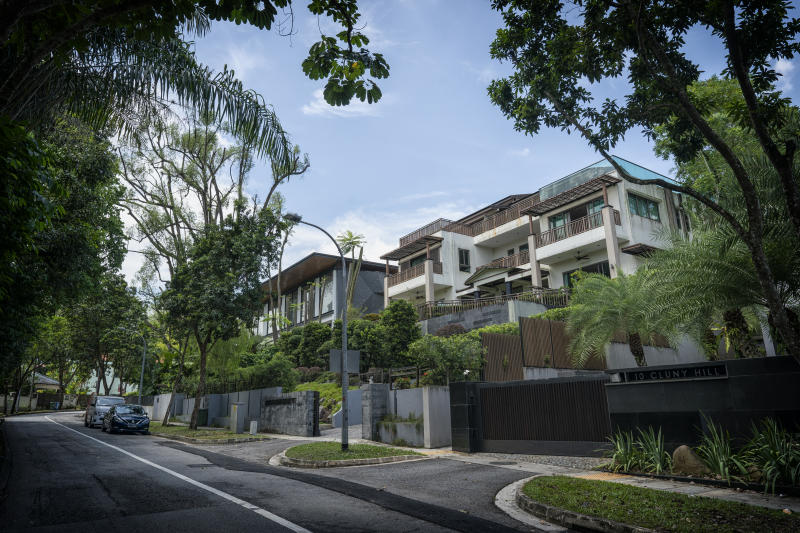A booming Thailand real estate market is shadowed by a growing wave of fraud, especially targeting foreign buyers. Mainland Chinese investors have been among the most affected, given their prominent share of foreign purchases last year. The story of Zoe Yu, a 45-year-old photographer from Ningbo, highlights the perils of investing in Thailand’s property sector, where regulations restrict foreign ownership of land and houses. Her experience—signing a 10-million-baht villa contract in Chiang Mai, then discovering the land ownership restriction and eventually securing a refund after substantial losses—serves as a cautionary tale for many outsiders drawn by lower living costs, education opportunities, and high-profile endorsements. Fraud in Thailand’s property market has intensified as more newcomers pool in with limited regulatory knowledge, creating a fertile ground for schemes ranging from falsified title deeds to illegal land sales. The scale of potential losses is staggering, with a single investor reportedly losing up to 400 million baht in some schemes.
Market dynamics and fraud landscape
The Thai property market has been expanding rapidly, buoyed by rising demand from foreign buyers who view real estate as a hedge against volatility at home and a chance to diversify their portfolios. As of recent years, official data show a robust foreign interest, particularly from Chinese buyers, who dominated foreign condo transactions in 2023. They accounted for nearly 46% of all condominium purchases by foreigners in that year, acquiring 6,614 units, which represented a 16% year-on-year rise. This trend has continued into the current year, with inquiries from mainland Chinese and Hong Kong buyers increasing by almost 50% compared with total figures for 2023, according to industry observers.
The market’s buoyancy, however, has attracted fraudsters who leverage information gaps, language barriers, and the allure of high returns. The nature of these scams ranges from forged title deeds and unlawful land sales to more sophisticated nominee arrangements designed to give foreign buyers the appearance of ownership. One of the most troubling allegations is the use of illegal nominee structures: buyers are led to believe they can own land by registering it under a Thai-nominee, a practice that is illegal in Thailand. If authorities later investigate or if the nominee asserts ownership, the foreign investor can lose everything. These schemes prey on the trust and enthusiasm of foreign entrants who assume that a formal contract or a flashy display by a developer guarantees clear ownership.
Alongside the general fraud risk, the Thai market has confronted a troubling pattern of due-diligence shortfalls. Law firms in the space, such as House Condo Lawyer, have highlighted how essential diligence often goes neglected, particularly when the transaction involves cross-border elements or high-profile endorsements. The firm notes that a large share of property fraud cases—arguably more than 60%—involve fellow nationals, underscoring a complex dynamic where trust within communities can obscure risks. In this context, the failure to perform basic checks—title verification, land registries, ownership records, and regulatory compliance—has become a recurring driver of losses for foreign buyers who rely on others’ assurances rather than verifiable documentation.
Despite the fraud wave, the broader property market in Thailand has not collapsed. Official statistics indicate a decline in residential property rights transfers amid a slowing economy, with overall transfer numbers falling by 6.6% in 2023 from the previous year, according to the Bank of Thailand. Yet foreign demand for property remains resilient. The Real Estate Information Centre (REIC) of the Government Housing Bank reported a 25% year-on-year increase in the number of flats transferred to foreign buyers in 2023, signaling sustained appetite among non-Thai investors even as domestic market dynamics show signs of moderation.
Regional hot spots in the country illustrate where foreign buyers are concentrating their attention. Chiang Mai, in the north, and popular southern destinations such as Koh Samui and Phuket have emerged as focal points for investment interest. Chiang Mai’s appeal—anchored in educational opportunities for international students and a comparatively lower cost of living—continues to attract buyers looking for more affordable options in a northern climate. Koh Samui and Phuket, with their resort amenities and established expatriate communities, remain magnets for buyers seeking lifestyle and rental yield potential, even as authorities watch for regulatory compliance and disclosure standards.
The marketing environment amplifies this dynamic. On Chinese social media platforms, real estate agencies and influencers emphasize attractive investment returns, affordable international education for children, and a lower cost of living in Thailand. Hashtags such as LifeInThailand and ThaiProperty have amassed substantial viewership, reflecting a robust appetite for information favorable to property investments, though the quality and accuracy of that information can vary widely. The spread of misinformation or overly optimistic projections in social media can mislead potential buyers about returns, timelines, and the legal framework governing ownership.
Against this backdrop, the Thai government has signaled intent to adjust foreign ownership rules to attract more capital, though the specifics remain under review. In June, the interior ministry tabled proposals to allow foreign buyers to own up to 75% of flats in a building, up from the current 49% cap, and to extend lease periods for foreigners to 99 years from 30. These proposed changes, if enacted, could represent the most significant market-wide adjustments in the Thai property sector in at least two decades. However, critics argue that such changes could raise regulatory and market risks, including the potential for price distortions, heightened competition for land, and challenges for enforcement of ownership rights.
Industry observers, including real estate technology groups, emphasize cautious optimism. Juwai IQI’s data indicates that inquiries from mainland Chinese and Hong Kong buyers spiked, signaling continued interest in Thai property despite broader economic uncertainties in China. The group’s leadership notes that due diligence and qualified legal guidance are essential for safeguarding investments in a market where regulatory complexity and potential misrepresentations threaten to erode investor confidence. In this environment, due diligence becomes not just prudent but essential to prevent substantial financial losses and to ensure compliance with Thai law.
Overall, the Thai market remains attractive to many international buyers, particularly those seeking diversification and potential rental income, but the fraud risk is real and persistent. The combination of high returns, social media amplification, and evolving regulatory proposals creates both opportunity and danger. For unwary buyers, the consequences can be dire: losses from misrepresented ownership, failed registrations, or irreversible commitments that bind them to unsuitable deals. In response, market participants emphasize the need for rigorous verification, independent legal counsel, and a cautious approach to any transaction that involves ownership rights in Thailand’s land or housing stock.
Structural factors affecting risk and enforcement
Several structural factors shape the risk landscape for foreign buyers in Thailand. The prohibition on foreigners owning land or individual houses directly creates a significant incentive for sophisticated schemes that mimic ownership, such as nominee structures. The legality and enforceability of such arrangements are frequently contested in courts and administrative bodies, adding complexity and risk for investors who rely on third parties for title transfers. The prevalence of non-Thai intermediaries and the potential for misrepresentation in the sales process further complicate due diligence. This is exacerbated by the fact that public records and land registries can be challenging to navigate for foreign buyers who are not fluent in Thai or familiar with local legal procedures.
Additionally, the sector has seen instances where developers fail to complete or properly register properties in buyers’ names. In some cases, buyers have discovered that titles do not reflect ownership, or that property delivery was delayed or never delivered at all. These outcomes underscore the importance of clear, enforceable contract terms, transparent registration processes, and independent verification of developers’ track records before entering into agreements. The risk environment is further intensified by claims of misrepresentation by sellers or brokers who rely on celebrity endorsements or high-profile recommendations to secure deals, rather than presenting a solid legal basis for ownership or transfer.
The Thai authorities’ ongoing examination of foreign ownership thresholds and lease extensions reflects a broader effort to reconcile investor demand with regulatory oversight. If implemented, such policy shifts could alter the supply-demand balance, influence property valuations, and affect the risk calculus for foreign buyers. While these proposals aim to unlock new capital inflows, they also require robust enforcement mechanisms and transparent disclosure standards to prevent abuse and protect buyers who rely on such reforms to secure legitimate ownership arrangements.
High-profile fraud cases and patterns
Several high-profile cases illuminate the pattern of foreign property fraud in Thailand and the consequences for those involved. Zoe Yu’s experience in Chiang Mai—where she signed a contract in January 2023 to purchase a 10-million-baht villa after an introduction by a Chinese celebrity—illustrates how celebrity endorsements and seemingly attractive terms can obscure legal vulnerabilities. Yu’s discovery that foreigners are prohibited from owning land or individual houses in Thailand, despite her contract lacking robust legal protections, underscores the mismatch between expectation and legal reality. Although she managed to secure a refund in July of the following year, the process, cost, and time involved took a heavy toll, with her losing more than a third of her investment in expenses and renovations. This case highlights the importance of understanding land ownership rules and the necessity of strong legal protections when entering into any property agreement.
Another notable case involves British investor David Edward Chappelle, who, in June 2023, became part of a public controversy after purchasing a Koh Samui flat for 15 million baht and discovering that the developer had failed to register the property in his name. He was among several foreign buyers entangled in this scheme, underscoring the risk of not having a guaranteed and verifiable title transfer or proper registration in the buyer’s name. The Koh Samui case gained notoriety for exposing gaps in the transfer process and the potential for developers to mismanage registration, resulting in substantial financial exposure for outsiders who assume legitimate ownership simply by purchasing a unit.
In September of the same year, two Australian buyers filed a fraud complaint in Phuket after paying more than 5 million baht for a flat that was never delivered. They pursued a civil court case and won a judgment, yet compensation has not yet been received, illustrating the gap that can exist between court rulings and actual restitution for foreign investors who have been defrauded. This case demonstrates the risk of incomplete delivery and the reluctance or delay in meeting court-ordered remedies, which can prolong financial distress for the victims and complicate efforts to recover losses.
These cases collectively reveal recurring patterns in property fraud involving foreign buyers. The use of high-profile figures, promotional campaigns, and sensational marketing to lure buyers into signing contracts before due diligence is complete is a common theme. The lack of immediate registration or proper transfer in the buyers’ names, or the inability to obtain timely compensation or registry updates after disputes, further compounds the vulnerabilities of foreign investors. The involvement of fellow nationals in many fraud cases also points to a broader trust dynamic that can obscure risk, underscoring the need for professional verification and independent legal oversight, especially for buyers who depend on referrals from within expatriate or international communities.
Lessons from the cases
- Due diligence is essential. One consistent lesson across these cases is that independent verification of ownership rights, title deeds, and land registries should precede any commitment. A contract that looks attractive on the surface may conceal fundamental flaws about ownership and transferability.
- Legal protections matter. When contracts lack enforceable protections or fail to secure a guaranteed title transfer, the risk of loss increases substantially. Foreign buyers should ensure that the sale agreement contains explicit provisions about title transfer, registration, and remedies in case of non-performance.
- Avoid relying on endorsements. Market promotion that hinges on celebrity endorsements or influencer recommendations should be approached with caution. While such endorsements can signal legitimacy, they do not substitute for legal due diligence and formal transfer procedures.
- Watch for nominee structures. The use of Thai nominee arrangements to enable foreign land ownership is illegal and hazardous. Buyers should be wary of any proposals that rely on nominees to circumvent ownership restrictions, as such arrangements can lead to immediate loss of investment and potential legal ramifications.
Regulatory actions and policy debates
Thailand’s response to fraud and investment risk in the property sector has included enforcement actions and policy discussions aimed at increasing transparency and investor protection. In Pattaya, police recently arrested five Chinese nationals for illegally operating as property brokers, signaling a crackdown on illicit intermediaries and the attempt to curb unscrupulous conduct in property transactions. Law enforcement action demonstrates the government’s willingness to intervene to maintain market integrity and safeguard foreign buyer interests.
From a policy perspective, officials have proposed notable changes to the foreign ownership framework that could reshape the market’s dynamics. The June proposals from the interior ministry aim to allow foreign buyers to own up to 75% of units in a building, increasing the current threshold of 49%. They also seek to extend lease periods for foreigners to 99 years from 30, which would significantly alter long-term ownership expectations and could influence pricing, financing arrangements, and investor confidence. However, these proposals have faced criticism and remain under review, indicating that policymakers are weighing the balance between attracting foreign capital and maintaining regulatory oversight and fairness for Thai citizens and local buyers.
Industry observers and legal experts emphasize that if these proposals are implemented, they would mark the most substantial changes in the Thai property market in decades, potentially altering risk profiles for foreign buyers. The conversation around these reforms highlights the tension between opening the market to international capital and preserving a regulatory framework that protects ownership clarity, ensures proper title transfer, and minimizes opportunities for fraud or misrepresentation. As policy discussions continue, stakeholders—ranging from developers and real estate platforms to lawyers and prospective buyers—are advised to monitor developments closely and plan investments with caution, ensuring robust due diligence and legal safeguards are in place.
The government’s approach to property investment and foreign ownership underscores the ongoing need for clear, enforceable rules and transparent processes. Industry groups such as Juwai IQI have urged investors to engage qualified real estate lawyers and conduct thorough due diligence to navigate regulatory complexities. Even as reforms move through committees and administrative reviews, the market must contend with potential transitional uncertainties, which can affect pricing, deal timing, and the availability of title documentation. In this environment, informed investors who partner with reputable professionals and maintain a conservative appraisal of risk are more likely to protect their capital and realize the intended benefits of investing in Thailand’s property market.
Due diligence best practices for foreign buyers
For foreigners considering real estate in Thailand, the landscape demands disciplined due diligence and careful risk assessment. The stories of Zoe Yu, David Chappelle, and the Australian couple illustrate the consequences of neglecting basic due diligence. To reduce risk, investors should adopt a structured process that emphasizes legal scrutiny, documentation, and transparency at every stage of the transaction.
Key steps include:
- Engage qualified Thai real estate attorney(s) who understand land ownership restrictions, registration processes, and the commercial terms of property contracts. Legal counsel should review all documents, verify ownership claims, and assess the enforceability of transfer provisions.
- Obtain independent title verification and land registry checks. This involves confirming that the seller holds a legitimate title, that the title corresponds to the property being purchased, and that there are no encumbrances or disputes pending with the land office.
- Conduct comprehensive due diligence on the developer and project. This includes reviewing the developer’s track record, licensing, past project completions, and any regulatory actions or disputes, as well as confirming that the project has the necessary permits and registrations for sale and development.
- Scrutinize ownership pathways and the legality of any nominee arrangements. If a party suggests ownership via a Thai nominee or a related structure, buyers should seek alternative arrangements that provide direct ownership rights and avoid illegal structures.
- Require clear, enforceable contracts with explicit transfer timelines, contingency provisions, and remedies for non-performance. Contracts should delineate who bears costs in the event of delays, and include protections such as escrow arrangements, milestones, and performance guarantees.
- Demand transparent disclosure of all costs and fees. Buyers should receive a complete breakdown of purchase price, taxes, transfer fees, maintenance costs, and any ongoing charges to avoid unpleasant surprises during or after the transaction.
- Secure reputable title insurance or equivalent protections where available. While not universally offered, any available protections can mitigate risk by providing recourse in the event of title disputes or defects.
- Verify regulatory compliance and licensing. Buyers should ensure that the project has all required regulatory approvals and that sellers have the authority to transact in the property.
In the current climate, investors are encouraged to approach Thai property transactions with heightened diligence, leveraging the expertise of professional real estate lawyers and reputable agencies. Recommendations from industry groups emphasize the importance of verifying ownership, title accuracy, and the legitimacy of the property transfer process before committing to any purchase.
Practical guidance for a safer path forward
- Start with a comprehensive risk assessment that considers regulatory changes, ownership restrictions, and potential enforcement actions.
- Prioritize direct ownership proofs and transparent title transfer mechanisms rather than relying on third-party assurances.
- Use independent assessors or third-party evaluators to verify property conditions, value, and compliance with development plans.
- Stay informed about policy developments from the interior ministry and other relevant agencies, as any proposed changes to foreign ownership thresholds or lease terms may affect investment viability.
- Maintain open communication with your legal counsel throughout negotiations, including every stage of due diligence and post-signing compliance.
Regional hotspots, investor sentiment, and market outlook
Multiple regions in Thailand have emerged as focal points for foreign property investment, each presenting unique opportunities and regulatory nuances. Chiang Mai has gained traction as a northern investment hotspot thanks to its more affordable living costs, education options, and a stable demand for rental properties among expatriates and students. The increase in foreign inquiries and purchases in Chiang Mai aligns with the broader trend of seeking value in provinces beyond Bangkok and the main tourist hubs.
Koh Samui and Phuket in the south have long been popular among foreign buyers seeking resort-style living and rental yields. The Koh Samui market was spotlighted by a British investor’s case, where a property valued at 15 million baht became a focal point of concern over proper ownership registration, underscoring the risk of proceeding without rigorous verification. Phuket’s market, with its tourist-driven demand, continues to attract foreign buyers, but also faces heightened scrutiny for compliance and the proper transfer of ownership documents.
The surge in social media content encouraging Thai property investment has contributed to a sense of optimism among some investors. The visibility of hashtags related to Thailand living and property has made Thai real estate a more visible destination for global buyers, amplifying the perception of high returns and affordable living. However, the same channels can mislead if the information presented is incomplete or misleading, underscoring the need for careful vetting and professional guidance.
In response to rising fraud risk and the evolving regulatory landscape, investors should approach these markets with a balanced perspective. While government reforms could unlock greater foreign participation and provide a more attractive long-term framework, they come with uncertainties about execution, enforcement, and the adequacy of protections for buyers. Market participants—developers, brokers, and lawyers—must collaborate to ensure that foreign investments are anchored in transparent processes, verifiable ownership rights, and robust remedies for any breach or misrepresentation. The overall sentiment among industry insiders emphasizes diligence and professional guidance as the foundation for sustainable investment success in Thailand’s real estate sector.
Conclusion
Thailand’s property market remains a magnet for foreign buyers, particularly from mainland China, drawn by cost advantages, educational opportunities, and lifestyle appeal. Yet this allure is counterbalanced by the rise of sophisticated fraud schemes and the ongoing challenge of ensuring lawful ownership and timely title transfers. From forged documents and illegal land sales to illegal nominee structures, the risks are real and have produced tangible losses for several investors, including those who trusted celebrity endorsements or relied on opaque assurances. High-profile cases in Chiang Mai, Koh Samui, and Phuket illustrate the spectrum of fraud risks and the urgent need for rigorous due diligence, independent legal guidance, and documented ownership rights.
The Thai authorities have responded with enforcement actions and policy discussions that could reshape foreign ownership rules and lease terms. While proposed changes—such as increasing the foreign ownership cap for flats and extending lease durations—offer potential benefits by attracting more capital, they also introduce new complexities, uncertainties, and enforcement considerations. In the meantime, investors are urged to proceed cautiously, prioritizing thorough due diligence, transparent documentation, and partnerships with qualified real estate lawyers to safeguard investments and navigate the evolving regulatory environment.
As the market evolves, the overarching takeaway for foreign buyers is clear: do not rush into agreements based on surface-level allure or promotional hype. Instead, adopt a methodical, well-supported approach that emphasizes verifiable ownership, enforceable contracts, and professional oversight. Such a stance not only reduces the risk of loss but also contributes to a healthier, more transparent foreign investment climate in Thailand’s dynamic real estate sector. For those drawn by the prospect of living in Thailand or building a coastal or northern retreat, Yu’s cautionary tale serves as a poignant reminder: vanity and haste can cost more than money—they can cost dreams.



